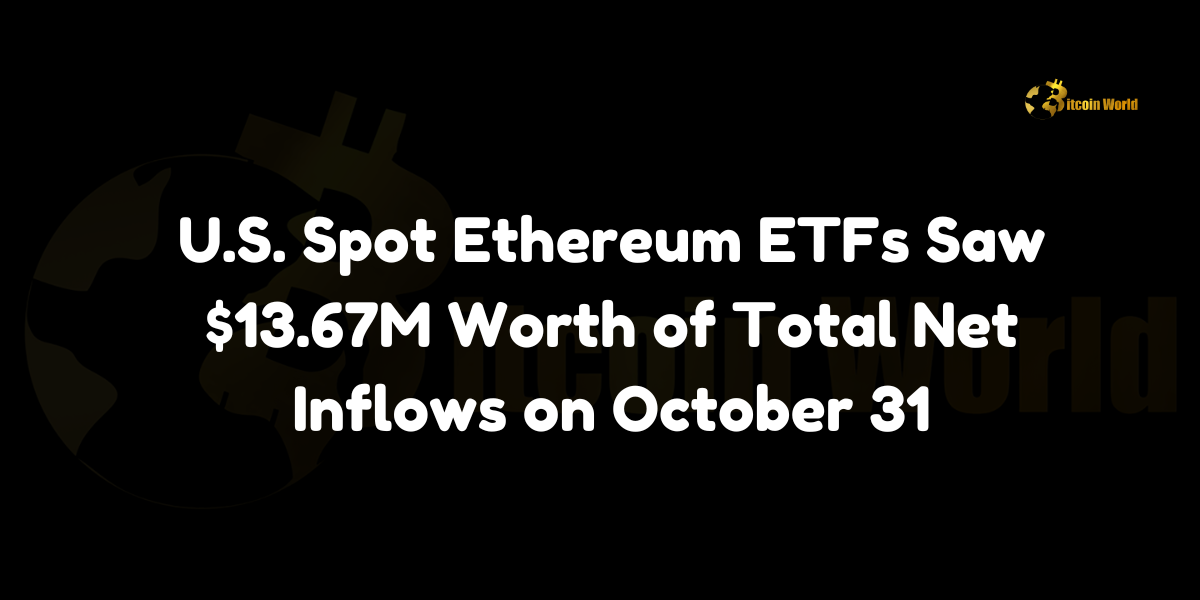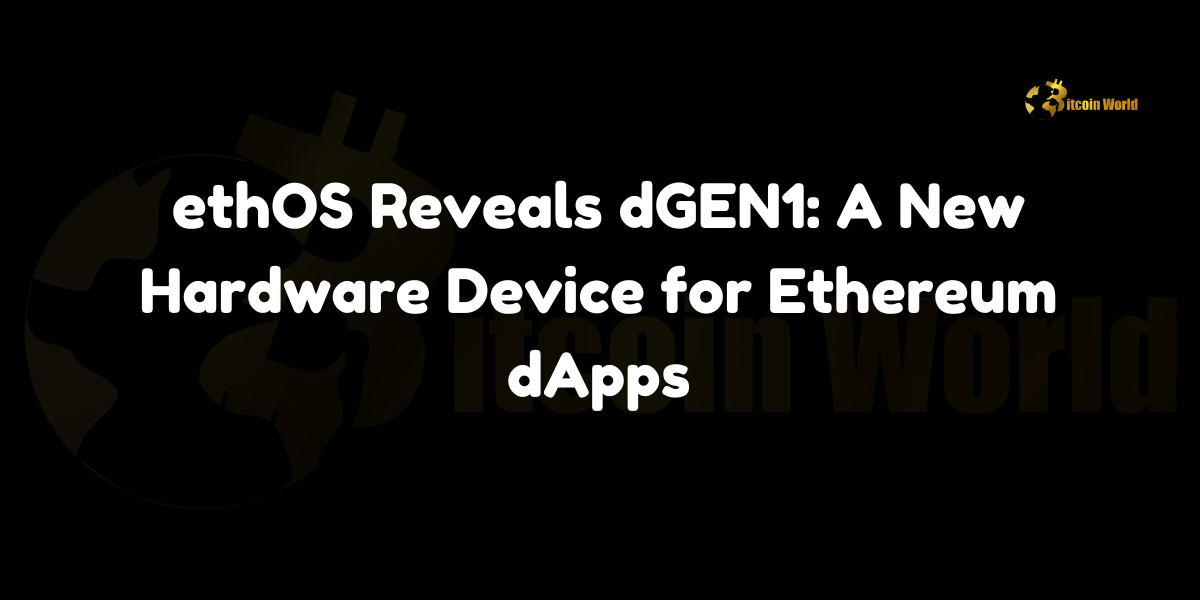US spot Ethereum ETFs experienced a combined net inflow of $13.67 million on October 31, according to an X post by Trader T. Among these, BlackRock’s ETHA recorded a significant net inflow of $50.25 million, while Grayscale’s ETHE saw a substantial net outflow of $36.58 million. The remaining ETFs reported no significant net inflows or outflows on the day. This trend reflects the dynamic nature of Ethereum investment and the varying investor sentiments towards different ETF offerings.
Introduction to Ethereum ETF Inflows
Overview of Net Inflows
The $13.67 million in net inflows on October 31 underscores a continued interest in Ethereum as a major digital asset. This influx marks a noteworthy day for Ethereum ETFs, highlighting the platform’s growing acceptance and the strategic moves of leading financial institutions in the cryptocurrency space.
Key Players in Ethereum ETF Performance
BlackRock’s ETHA: Net inflow of $50.25 million
Grayscale’s ETHE: Net outflow of $36.58 million
Other ETFs: No significant net inflows or outflows
Detailed Analysis of Specific Ethereum ETFs
BlackRock’s ETHA
BlackRock’s ETHA led the net inflows with an impressive $50.25 million. As one of the world’s largest asset managers, BlackRock’s entry into the Ethereum ETF market has been met with strong investor interest. The significant inflow can be attributed to BlackRock’s reputation, robust fund management, and the growing demand for Ethereum exposure among institutional and retail investors.
Grayscale’s ETHE
In contrast, Grayscale’s ETHE experienced a notable net outflow of $36.58 million. Grayscale has been a dominant player in the cryptocurrency investment space, and the outflow may indicate investors rebalancing their portfolios or taking profits from previous investments. Factors such as ETF performance, fee structures, and market sentiment towards Ethereum could have influenced this movement.
Other Ethereum ETFs
The remaining Ethereum ETFs did not report any significant net inflows or outflows on October 31. This neutrality suggests a stabilization in the investment strategies of these funds or a wait-and-see approach from investors amidst the current market conditions.
Factors Driving Inflows and Outflows
Institutional Confidence
The substantial inflow into BlackRock’s ETHA reflects growing institutional confidence in Ethereum as a long-term investment. BlackRock’s extensive research, risk management, and investor outreach efforts likely played a crucial role in attracting substantial capital inflows.
Market Volatility and Profit-Taking
The outflow from Grayscale’s ETHE may be influenced by market volatility and profit-taking strategies. Investors might be capitalizing on favorable Ethereum price movements by withdrawing funds to secure profits or diversify their investment portfolios.
Regulatory Developments
Ongoing regulatory developments in the cryptocurrency space can impact investor behavior. Enhanced regulatory clarity can boost investor confidence, leading to inflows, while regulatory uncertainties might prompt withdrawals to mitigate risks.
Performance Metrics
The performance of Ethereum ETFs relative to other investment opportunities also plays a significant role. Superior performance metrics can attract inflows, whereas underperformance or high fees can drive outflows as investors seek more cost-effective or high-performing alternatives.
Implications for the Ethereum Market
Enhanced Liquidity and Market Stability
Consistent inflows into Ethereum ETFs contribute to enhanced liquidity and market stability. Increased investment through ETFs can lead to tighter bid-ask spreads and reduced volatility, making Ethereum a more attractive asset for both institutional and retail investors.
Influence on Ethereum Price
Large-scale investments through ETFs can exert upward pressure on Ethereum prices. As ETFs accumulate more Ethereum, the demand can drive prices higher, especially during periods of sustained inflows and positive market sentiment.
Competitive Landscape Among ETF Providers
The varying inflows and outflows among different Ethereum ETFs highlight the competitive dynamics within the market. Providers like BlackRock, with strong brand reputation and robust fund management, are gaining traction, while others may need to innovate or adjust their strategies to retain investor interest.
Expert Opinions
Dr. Emily Carter, Blockchain Analyst
“The net inflow into BlackRock’s ETHA signifies a strong endorsement of Ethereum’s potential as a core asset in diversified investment portfolios. BlackRock’s involvement brings credibility and attracts a broader range of investors, potentially driving further institutional adoption of Ethereum.”
Mark Thompson, Financial Strategist
“Grayscale’s outflow from ETHE indicates that investors are actively managing their exposure to Ethereum, possibly reallocating funds to other assets or taking profits amidst a volatile market. It’s essential for ETF providers to continuously enhance their offerings to meet evolving investor needs.”
Sarah Lee, Cryptocurrency Researcher
“The steady inflows into Ethereum ETFs like BlackRock’s ETHA demonstrate the maturing of the cryptocurrency investment landscape. As more institutional players enter the market, we can expect greater stability and increased adoption of Ethereum as a mainstream investment vehicle.”
Future Outlook
Continued Growth in Ethereum ETF Adoption
As Ethereum continues to establish itself as a key player in the cryptocurrency ecosystem, the adoption of Ethereum ETFs is expected to grow. This growth will be driven by increasing institutional interest, improved regulatory frameworks, and the ongoing development of Ethereum’s technology and use cases.
Regulatory Clarity and Its Impact
Future regulatory clarity will play a significant role in shaping the Ethereum ETF landscape. Clear and supportive regulations can enhance investor confidence, leading to increased inflows, while stringent or unclear regulations might pose challenges for ETF providers and investors alike.
Technological Innovations and ETF Offerings
Advancements in Ethereum’s technology, such as the implementation of Ethereum 2.0 and enhanced scalability solutions, can positively influence ETF performance and attractiveness. Additionally, ETF providers may introduce innovative products, such as leveraged or inverse Ethereum ETFs, to cater to diverse investor strategies.
Market Competition and Differentiation
With more financial institutions entering the Ethereum ETF market, competition will intensify. ETF providers will need to differentiate their offerings through superior performance, lower fees, enhanced features, and robust investor support to attract and retain capital.
Conclusion
The $13.67 million in net inflows into U.S. spot Ethereum ETFs on October 31, driven primarily by BlackRock’s ETHA and offset by outflows from Grayscale’s ETHE, reflects the dynamic and evolving nature of Ethereum investment. This trend highlights the growing institutional interest and the competitive landscape of Ethereum ETFs, which play a pivotal role in bridging the gap between traditional finance and the burgeoning cryptocurrency market.
As Ethereum continues to gain traction as a mainstream investment asset, the sustained interest in its ETFs is expected to contribute to market liquidity, stability, and price appreciation. However, ETF providers must navigate the challenges of market volatility, regulatory developments, and competitive pressures to maintain and grow their investor base.
To stay updated on the latest developments in cryptocurrency investments and ETF trends, explore our article on latest news, where we cover significant events and their impact on the digital asset ecosystem.





